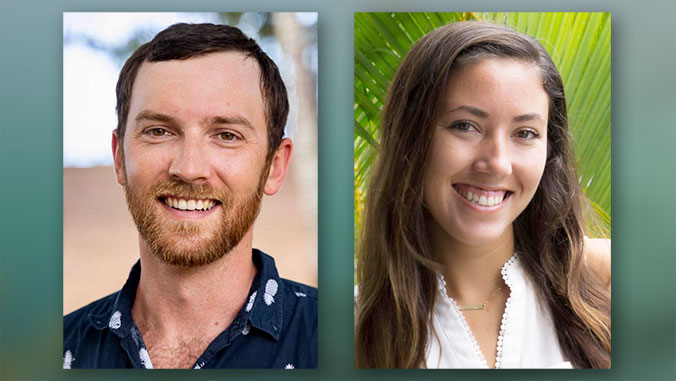
Two graduate students representing the University of Hawaiʻi Sea Grant College Program were awarded the prestigious 2021 John A. Knauss Marine Policy Fellowship and recently began their one-year paid fellowships in Washington, D.C. focusing on critical marine policy issues.
Derek Kraft and Anita Harrington were selected from a highly competitive pool of applicants from across the nation to serve in either the legislative or executive branches of government.
“We are excited to welcome the 2021 class of Knauss fellows and look forward to the skill and perspective that they will provide towards addressing critical marine policy and science challenges,” said Jonathan Pennock, National Sea Grant College Program director. “As the government and the sciences adapt to new norms for working driven by the COVID-19 pandemic, the Knauss fellowship will create novel opportunities for the fellows to redefine how government and science interact and operate for the benefit of society.”
Derek Kraft
Kraft, who recently completed his PhD in marine biology at UH Mānoa, will be spending one year in the NOAA Fisheries Highly Migratory Species Management Division.
As a PhD student, his research focused on conservation genetics of sharks, and he developed a shark bite forensics protocol used to identify the shark species involved in bites on surfboards, wetsuits and fish. The year at NOAA will provide him with an opportunity to continue his passion for developing policies for the sustainable management of sharks, tunas and billfish.
Kraft noted “I feel honored to have landed in the Highly Migratory Species Management Division for my Knauss Fellowship. I’m excited for this experience, and hope it leads to a successful career in fisheries management so I can see how my PhD research on conservation genetics of sharks plays into sustainable management of my favorite creatures—sharks!”
Anita Harrington
During her time at Hawaiʻi Pacific University completing a master’s degree in marine science, Harrington began her pursuit of a career in conservation and environmental stewardship through studying the winged box jellyfish in Hawaiʻi.
In Washington D.C. she will have the opportunity to work as a science and policy fellow for the U.S. Fish and Wildlife Service in the Science Applications Office. She joined the team at a critical time as it begins to focus heavily on integrating critical climate adaptation and resiliency strategies throughout the organization.
Harrington said, “This year, I will be spending most of my time as a member of the Climate Change Workgroup which is focused on implementing the new administration’s climate change goals and policies. I look forward to collaborating with colleagues of diverse backgrounds to provide necessary information on climate change and help bring the topic to the forefront of discussion.”
This effort is an example of UH Mānoa’s goal of Enhancing Student Success (PDF), one of four goals identified in the 2015–25 Strategic Plan (PDF), updated in December 2020.
For more information, see the Hawaiʻi Sea Grant website.
–By Cindy Knapman

